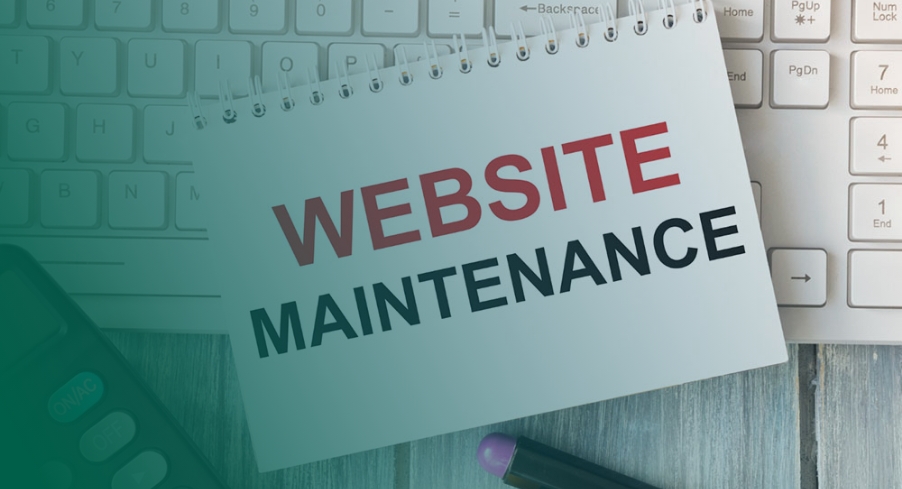Table of Contents
- 1. What is website maintenance?
- 2. Why is website maintenance important?
- 3. What services are included in website maintenance?
- 4. Can I handle website maintenance on my own?
- 5. How often should website maintenance be performed?
- 6. What would happen if I don’t maintain my website?
- 7. Are WordPress websites more prone to security issues?
- 8. My website isn’t that big or complicated; do I still need a maintenance plan?
- 9. How much does website maintenance cost?
- 10. How do I choose a website maintenance service provider?
- 11. Can website maintenance improve my search engine rankings?
- 12. What if my website goes down or gets hacked?
- Final thoughts
TABLE OF CONTENTS
Add a header to begin generating the table of contents

Website maintenance is a crucial aspect of running a successful online presence. It involves regular updates, monitoring, and optimization to ensure your website remains secure, functional, and up-to-date. In this blog, we will address some of the frequently asked questions about website maintenance services to help you understand their importance and make informed decisions for your website’s upkeep.
1. What is website maintenance?
Website maintenance encompasses a range of activities necessary to ensure the smooth functioning and optimal performance of a website. It involves regular updates and monitoring to keep the website secure, up-to-date, and free from bugs or errors.
Website maintenance encompasses a range of activities necessary to ensure the smooth functioning and optimal performance of a website. It involves regular updates and monitoring to keep the website secure, up-to-date, and free from bugs or errors.
In essence, website maintenance is a proactive approach to address technical issues, enhance user experience, and keep the website running smoothly.
2. Why is website maintenance important?
According to a study by Symantec, 75% of websites experience at least one significant vulnerability each year, highlighting the critical need for regular maintenance to ensure security. So, it clearly indicates that without regular maintenance of your website, it’s likely to develop issues or may get hacked. So, website maintenance is vital for various reasons.
- Regular maintenance ensures the security of your website and protects it from potential vulnerabilities and cyberattacks. It involves applying security patches, updating software, and monitoring for any suspicious activities.
- Maintenance helps to optimize website performance, ensuring fast loading times and a smooth user experience. Studies have shown that slow-loading websites lead to higher bounce rates and lower conversion rates.
- Maintenance allows you to keep your website up to date with fresh content, accurate information, and the latest design trends. This helps to engage your audience, improve search engine rankings, and stay ahead of the competition.
3. What services are included in website maintenance?
Website maintenance services can vary depending on the provider, but they typically include:
- Content updates and additions.
- Regular software updates (e.g., CMS, plugins, themes).
- Backups and data restoration.
- Security monitoring and vulnerability patching.
- Performance optimization.
- Bug fixing and error troubleshooting.
- SEO improvement-related tasks.
- Domain and hosting management.
With our website maintenance services, provide all of the above services.
4. Can I handle website maintenance on my own?
Handling website maintenance on your own is possible if you have the necessary skills, time, and resources. Basic tasks such as updating content, monitoring website performance, and performing routine backups can be managed by website owners. However, it is important to consider the potential challenges involved. Website maintenance requires technical knowledge, including familiarity with content management systems (CMS), coding languages, and security practices. It also demands regular time commitment, as updates and security checks should be performed consistently.
So, outsourcing website maintenance to professionals can provide several advantages, such as expert knowledge, efficient handling of complex tasks, and the ability to focus on core business activities. Assess your capabilities and resources before deciding whether to handle website maintenance independently or seek professional assistance.
5. How often should website maintenance be performed?
The frequency of website maintenance depends on various factors, including the complexity of your website and your specific needs. However, as a general guideline, it is recommended to perform website maintenance tasks regularly, at least once a month.
This typically includes updating software and plugins, monitoring security, and reviewing website performance. For software updates and security checks, a monthly schedule is often suitable. Content updates, such as adding new blog posts or updating product information, can be done more frequently, depending on your industry and audience.
6. What would happen if I don’t maintain my website?
If you neglect to maintain your website, several negative consequences can arise.
- Security vulnerabilities can leave your website exposed to hacking attempts, compromising sensitive data, and damaging your reputation.
- Outdated software and plugins can lead to compatibility issues, causing functionality problems and potential crashes.
- Without regular updates and optimization, your website’s performance can suffer, resulting in slow loading times and a poor user experience. Additionally, search engine rankings may decline as search algorithms favor websites with fresh content and optimized performance.
Overall, the lack of website maintenance can lead to a diminished online presence, loss of traffic, and potential business setbacks.
7. Are WordPress websites more prone to security issues?
WordPress websites are often considered more prone to security issues due to their popularity and widespread use. However, it is important to note that the security vulnerabilities in WordPress websites are typically a result of misconfiguration, outdated software, or weak passwords rather than inherent flaws in the platform itself. The open-source nature of WordPress also means that potential vulnerabilities can be quickly identified and addressed by the vast community of developers.
With proper security measures in place, such as regular updates, strong passwords, secure plugins and themes, and a reliable hosting environment, WordPress websites can be just as secure as any other website. It’s crucial to prioritize website maintenance and follow best security practices to mitigate the risks associated with any website, including WordPress.
8. My website isn’t that big or complicated; do I still need a maintenance plan?
Yes, even if your website is small or uncomplicated, having a maintenance plan is still essential. While larger websites may have more complex needs, all websites, regardless of size, require regular updates, security measures, and performance optimizations. Neglecting maintenance can leave your website vulnerable to security breaches, slow loading times, and potential compatibility issues. A maintenance plan ensures that your website remains secure, and up-to-date, and provides a positive user experience, regardless of its size or complexity.
9. How much does website maintenance cost?
The cost of website maintenance can vary depending on factors such as the size and complexity of your website, the scope of services required, and the frequency of updates. Some website maintenance providers offer monthly packages that range from a few hundred dollars to a few thousand dollars. Other providers may charge an hourly rate or offer customized pricing based on specific needs. It’s best to request quotes from different providers to get an accurate estimate for your website’s maintenance costs.
10. How do I choose a website maintenance service provider?
When selecting a website maintenance service provider, consider the following factors:
- Experience and expertise in website maintenance.
- Range of services offered and whether they align with your specific requirements.
- Reputation and customer reviews.
- Communication channels and response times.
- Pricing structure and contract terms.
- Security measures and data protection policies.
- Availability of customer support and maintenance reports.
11. Can website maintenance improve my search engine rankings?
Yes, website maintenance can have a positive impact on your search engine rankings. Search engines favor websites that are regularly updated, offer a seamless user experience, and have strong security measures in place.
By implementing website maintenance practices such as content updates, optimizing keywords, improving website speed, and fixing broken links, you can enhance the overall quality and relevance of your website. Regular maintenance also helps to ensure that your website is properly indexed by search engines, making it easier for them to crawl and understand your content. As a result, maintaining an optimized website can lead to improved search engine visibility, increased organic traffic, and ultimately higher search engine rankings.
12. What if my website goes down or gets hacked?
In the unfortunate event that your website goes down or gets hacked, it is crucial to have a plan in place to mitigate the impact and restore your website quickly. With a robust website maintenance strategy, you can minimize the risk of such incidents by implementing security measures, performing regular backups, and staying updated with the latest security patches.
In the event of a website outage, working with a reliable hosting provider can help address the issue promptly. If your website gets hacked, it is essential to have backups in place to restore your website to a previous state before the breach.
Additionally, engaging the services of a professional website maintenance provider can provide you with expertise in handling security breaches, identifying vulnerabilities, and implementing measures to prevent future incidents. Prompt response, thorough investigation, and proactive security measures are key to recovering from website downtime or security breaches effectively.
Final thoughts
Website maintenance plays a vital role in keeping your website secure, functional, and up to date. By addressing common questions about website maintenance services, this blog aimed to provide you with a better understanding of their importance and benefits. Whether you choose to handle the maintenance yourself or outsource it to professionals, regular upkeep is essential to ensure your website remains an asset for your business.




